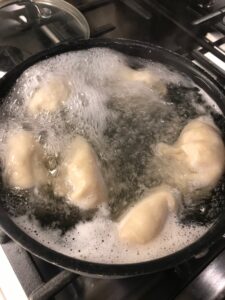As a serious food tourist I love the Traveling Spoon model of peer-to-peer meals and cooking lessons. It’s a great way to make new friends, learn cooking techniques, and eat tasty local food. Sadly, with no travel during the pandemic, there’s no food tourism. But we have an at-home alternative: online cooking classes with some of the Traveling Spoon hosts.
Traveling Spoon has been in business for seven years now, steadily expanding around the world. In May they acquired another similar company: Meal Sharing. But of course, with the Covid-19 pandemic, no one is traveling right now. In response to the lockdowns the clever folks who run Traveling Spoon quickly pivoted to offer online cooking classes. You’re still not visiting another country, but you can spend an evening cooking with someone from Morocco, Argentina, India, Mexico, Japan or many other countries.
Making Dumplings with Instruction from Georgia (the country)
Like so many others around the world on lockdown, I’ve been entertaining myself with expanded home cooking. I’ve followed the trend and taken up sourdough bread baking. And I’m enjoying remote video cooking parties with friends. So when I came across the Traveling Spoon online classes I was excited to share the options with my two regular video cooking buddies. They picked the Georgian Khinkali dumpling class. I know nothing about Georgian food. But my friends visited Georgia last year and loved Khinkali.
There’s one complication to doing online video classes in real time with a host in another country: the time zone. Initially I  requested a class starting at 6pm. I wanted to eat dinner at a reasonable hour and was budgeting two hours for cooking. Our host quickly got in touch to ask if we could do it later. 6pm our time would be 5am her time. After some discussion we agreed to start an hour later. I did offer to do the class in the morning (for us), and just leave the final step of boiling the dumplings for evening. But in the end, she provided a lot of instruction during the dumpling cooking (and eating!), so I understand why she didn’t want to leave us on our own for that part.
requested a class starting at 6pm. I wanted to eat dinner at a reasonable hour and was budgeting two hours for cooking. Our host quickly got in touch to ask if we could do it later. 6pm our time would be 5am her time. After some discussion we agreed to start an hour later. I did offer to do the class in the morning (for us), and just leave the final step of boiling the dumplings for evening. But in the end, she provided a lot of instruction during the dumpling cooking (and eating!), so I understand why she didn’t want to leave us on our own for that part.
Tina, our host for the class, was absolutely delightful. Her English is excellent (fortunately since none of us speak Georgian) and she has a relaxed and friendly manner that allowed for a flowing conversation while still giving careful and attentive cooking instructions. “Tell me about your family. Oh add a little more water to your dough, good, keep kneading. OK, so you have how many brothers?” By the end of the class I was excited to visit Tina and her family whenever I make it to Tbilisi.
To be clear, khinkali isn’t easy to make. The ingredients are simple enough. But the dough is hard. Literally hard. It’s a workout! When we started mixing the flour and water Tina casually said “the men usually make the dough because it requires big muscles” and I thought she was kidding, or that this was a cultural thing. But in fact I was sore the next day. About an hour of our cooking time was spent working on the dough, kneading and rolling it out. And then there’s the delicate task of stuffing the dumplings and boiling them without inducing holes. Khinkali are soup dumplings: a juicy bite of dough filled with meat, soupy enough that there is a technique to slurping up the juice.
How does the video experience compare to in-home experiences?
Obviously a video cooking class is a poor substitute for visiting someone’s home in another country. A typical Traveling Spoon experience includes multiple dishes, often with a visit to the local market before cooking. And there’s less pressure on the foreign visitor to get things right in the cooking process. I usually act as a sous chef, helping out and learning techniques. But in a video lesson it was all on me if the meal didn’t come out right.
Even with those challenges, the cooking class far exceeded my expectations. I felt like we really got to know Tina and gain some insight into Georgian culture. And I learned more khinkali making skills than I would have just helping out as a sous chef.
Although the video quality wasn’t excellent, Tina easily looked at our work and provided feedback. She accurately judged the pliability of my dough just by seeing how it hung when I held it up to the camera. And was spot on about the consistency of my filling even with my bowl off in the distance. I never felt like I was cooking alone.
I still prefer the in person Traveling Spoon food tourism experiences. But in between trips I would definitely do another remote cooking class if they are still offered after the pandemic.
If you haven’t tried Traveling Spoon yet, sign up using my referral link for $20 off your first booking.


